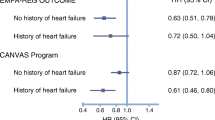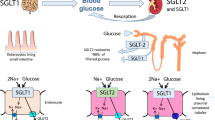Abstract
Components present in the diet, l-carnitine, choline, and betaine are metabolized by gut microbiota to produce metabolites such as trimethylamine-N-oxide (TMAO) that appear to promote cardiovascular disease in chronic kidney disease (CKD) patients. The objective of this pilot study was to evaluate the effects of probiotic supplementation for 3 months on plasma TMAO levels in CKD patients on hemodialysis (HD). A randomized, double-blind trial was performed in 21 patients [54.8 ± 10.4 years, nine men, BMI 26.1 ± 4.8 kg/m2, dialysis vintage 68.5 (34.2–120.7) months]. Ten patients were randomly allocated to the placebo group and 11 to the probiotic group [three capsules, totaling 9 × 1013 colony-forming units per day of Streptococcus thermophilus (KB19), Lactobacillus acidophilus (KB27), and Bifidobacteria longum (KB31). Plasma TMAO, choline, and betaine levels were measured by LC-MS/MS at baseline and after 3 months. While TMAO did not change after probiotic supplementation, there was a significant increase in betaine plasma levels. In contrast, the placebo group showed a significant decrease in plasma choline levels. Short-term probiotic supplementation does not appear to influence plasma TMAO levels in HD patients. Long-term studies are needed to determine whether probiotics may affect TMAO production in CKD patients.

Similar content being viewed by others
References
Vaziri ND, Wong J, Pahl M, Piceno YM, Yuan J, De Santis TZ, Ni Z, Nguyen TH, Andersen GL (2013) Chronic kidney disease alters intestinal microbial flora. Kidney Int 83(2):308–315. https://doi.org/10.1038/ki.2012.345
Wang Z, Tang WW, Buffa JA, Fu X, Britt EB, Koeth RA, Levison BS, Fan Y, Wu Y, Hazen SL (2014) Prognostic value of choline and betaine depends on intestinal microbiota-generated metabolite trimethylamine-N-oxide. Eur Heart J 35:904–910. https://doi.org/10.1093/eurheartj/ehu002
Nallu A, Sharma S, Ramezani A, Muralidharan J, Raj D (2016) Gut microbiome in chronic kidney disease: challenges and opportunities. Transl Res 179:24–37. https://doi.org/10.1016/j.trsl.2016.04.007
Ramezani A, Massy ZA, Meijers B, Evenepoel P, Vanholder R, Raj DS (2016) Role of the gut microbiome in uremia: a potential therapeutic target. Am J Kidney Dis 67(3):483–498. https://doi.org/10.1053/j.ajkd.2015.09.027
Moraes C, Fouque D, Amaral ACF, Mafra D (2015) Trimethylamine N-oxide from gut microbiota in chronic kidney disease patients: focus on diet. J Ren Nutr 25(6):459–465. https://doi.org/10.1053/j.jrn.2015.06.004
Missailidis C, Hällqvist J, Qureshi AR, Barany P, Heimbürger O, Lindholm B, Stenvinkel P, Bergman P (2016) Serum trimethylamine-N-oxide is strongly related to renal function and predicts outcome in chronic kidney disease. PLoS One 11(1):e0141738. https://doi.org/10.1371/journal.pone.0141738
Wang Z, Klipfell E, Bennett BJ, Koeth R, Levison BS, Dugar B, Feldstein AE, Britt EB, Fu X, Chung YM, Wu Y, Schauer P, Smith JD, Allayee H, Tang WH, DiDonato JA, Lusis AJ, Hazen SL (2011) Gut flora metabolism of phosphatidylcholine promotes cardiovascular disease. Nature 472:57–63. https://doi.org/10.1038/nature09922
Cho CE, Taesuwan S, Malysheva OV, Bender E, Tulchinsky NF, Yan J, Sutter JL, Caudill MA (2017) Trimethylamine-N-oxide (TMAO) response to animal source foods varies among healthy young men and is influenced by their gut microbiota composition: a randomized controlled trial. Mol Nutr Food Res 61(1). doi: https://doi.org/10.1002/mnfr.201600324
Lang D, Yeung C, Peter R, Ibarra C, Gasser R, Itagaki K, Philpot RM, Rettie AE (1998) Isoform specificity of trimethylamine-N-oxygenation by human flavin-containing monooxygenase (FMO) and P450 enzymes: selective catalysis by FMO3. Biochem Pharmacol 56(8):1005–1012. https://doi.org/10.1016/S0006-2952(98)00218-4
Koeth RA, Wang Z, Levison BS, Buffa JA, Org E, Sheehy BT, Britt EB, Fu X, Wu Y, Li L, Smith JD, DiDonato JA, Chen J, Li H, Wu GD, Lewis JD, Warrier M, Brown JM, Krauss RM, Tang WH, Bushman FD, Lusis AJ, Hazen SL (2013) Intestinal microbiota metabolism of L-carnitine, a nutrient in red meat, promotes atherosclerosis. Nat Med 19:576–585. https://doi.org/10.1038/nm.3145
Bain MA, Faull R, Fornasini G, Milne RW, Evans AM (2006) Accumulation of trimethylamine and trimethylamine-N-oxide in end-stage renal disease patients undergoing haemodialysis. Nephrol Dial Transplant 21:1300–1304. https://doi.org/10.1093/ndt/gfk056
He Z, Chen Z-Y (2017) What are missing parts in the research story of trimethylamine-N-oxide (TMAO)? J Agric Food Chem 65:5227–5228. https://doi.org/10.1021/acs.jafc.7b02744
Hill C, Guarner F, Reid G, Gibson GR, Merenstein DJ, Pot B, Morelli L, Canani RB, Flint HJ, Salminen S, Calder PC, Sanders ME (2014) The International Scientific Association for Probiotics and Prebiotics consensus statement on the scope and appropriate use of the term probiotic. Nat Rev Gastroenterol Hepatol 11(8):506–514. https://doi.org/10.1038/nrgastro.2014.66
Pandey KR, Naik SR, Vakil BV (2015) Probiotics, prebiotics and synbiotics—a review. J Food Sci Technol 52(12):7577–7587. https://doi.org/10.1007/s13197-015-1921-1
Koppe L, Mafra D, Fouque D (2015) Probiotics and chronic kidney disease. Kidney Int 88(5):958–966. https://doi.org/10.1038/ki.2015.255
Borges NA, Carmo FL, Stockler-Pinto MB, de Brito JS, Dolenga CJ, Ferreira DC, Nakao LS, Rosado A, Fouque D, Mafra D (2018) Probiotic supplementation in chronic kidney disease: a double-blind, randomized, placebo-controlled trial. J Renal Nutr 28(1):28–36. https://doi.org/10.1053/j.jrn.2017.06.010
Natarajan R, Pechenyak B, Vyas U, Ranganathan P, Weinberg A, Liang P, Mallappallil MC, Norin AJ, Friedman EA, Saggi SJ (2014) Randomized controlled trial of strain-specific probiotic formulation (Renadyl) in dialysis patients. Biomed Res Int 2014(568571):1–9. https://doi.org/10.1155/2014/568571
Ciorba MA (2012) A gastroenterologist’s guide to probiotics. Clin Gastroenterol Hepatol 10(9):960–968. https://doi.org/10.1016/j.cgh.2012.03.024
Chang HY, Chen JH, Chang JH, Lin HC, Lin CY, Peng CC (2017) Multiple strains probiotics appear to be the most effective probiotics in the prevention of necrotizing enterocolitis and mortality: an updated meta-analysis. PLoS One 12(2):e0171579. https://doi.org/10.1371/journal.pone.0171579
Levy M, Kolodziejczyk AA, Thaiss CA, Elinav E (2017) Dysbiosis and the immune system. Nat Rev Immunol 17(4):219–232.4. https://doi.org/10.1038/nri.2017.7
Jonsson AL, Bäckhed F (2017) Role of gut microbiota in atherosclerosis. Nat Rev Cardiol 14(2):79–87. https://doi.org/10.1038/nrcardio.2016.183
Tang WH, Wang Z, Levison BS, Koeth RA, Britt EB, Fu X, Wu Y, Hazen SL (2013) Intestinal microbial metabolism of phosphatidylcholine and cardiovascular risk. N Engl J Med 368(10):1575–1584. https://doi.org/10.1056/NEJMoa1109400
Tang WHW, Hazen SL (2014) The contributory role of gut microbiota in cardiovascular disease. Clin Invest 124(10):4204–4211. https://doi.org/10.1172/JCI72331
Kim RB, Morse BL, Djurdjev O, Tang M, Muirhead N, Barrett B, Holmes DT, Madore F, Clase CM, Rigatto C, Levin A (2016) Advanced chronic kidney disease populations have elevated trimethylamine N-oxide levels associated with increased cardiovascular events. Kidney Int 89(5):1144–1152. https://doi.org/10.1016/j.kint.2016.01.014
Martin F-PJ, Wang Y, Sprenger N, Yap IK, Lundstedt T, Lek P, Rezzi S, Ramadan Z, van Bladeren P, Fay LB, Kochhar S, Lindon JC, Holmes E, Nicholson JK (2008) Probiotic modulation of symbiotic gut microbial-host metabolic interactions in a humanized microbiome mouse model. Mol Syst Biol 4:157. https://doi.org/10.1038/msb4100190
Qiu L, Yang D, Tao X, Yu J, Xiong H, Wei H (2017) Enterobacter aerogenes ZDY01 attenuates choline-induced trimethylamine N-oxide levels via remodeling gut microbiota in mice. J Microbiol Biotechnol 27(8):1491–1499. https://doi.org/10.4014/jmb.1703.03039
Boutagy NE, Neilson AP, Osterberg KL, Smithson AT, Englund TR, Davy BM, Hulver MW, Davy KP (2015) Probiotic supplementation and trimethylamine-N-oxide production following a high-fat diet. Obesity 23(12):2357–2363. https://doi.org/10.1002/oby.21212
Tripolt NJ, Leber B, Triebl A, Köfeler H, Stadlbauer V, Sourij H (2015) Effect of lactobacillus casei Shirota supplementation on trimethylamine-N-oxide levels in patients with metabolic syndrome: an open-label, randomized study. Atherosclerosis 242(1):141–144. https://doi.org/10.1016/j.atherosclerosis.2015.05.005
Taki K, Takayama F, Niwa T (2005) Beneficial effects of Bifidobacteria in a gastroresistant seamless capsule on hyperhomocysteinemia in hemodialysis patients. J Ren Nutr 15(1):77–80. https://doi.org/10.1053/j.jrn.2004.09.028
Ranganathan N, Ranganathan P, Friedman EA, Joseph A, Delano B, Goldfarb DS, Tam P, Rao AV, Anteyi E, Musso CG (2010) Pilot study of probiotic dietary supplementation for promoting healthy kidney function in patients with chronic kidney disease. Adv Ther 27:634–647. https://doi.org/10.1007/s12325-010-0059-9
Miranda Alatriste PV, Urbina Arronte R, G_omez Espinosa CO, Espinosa Cuevas Mde L (2014) Effect of probiotics on human blood urea levels in patients with chronic renal failure. Nutr Hosp 29:582–590. https://doi.org/10.3305/nh.2014.29.3.7179
Sitaraman R (2013) Phospholipid catabolism by gut microbiota and the risk of cardiovascular disease. J Med Microbiol 62:948–950. https://doi.org/10.1099/jmm.0.053587-0
Serino M, Blasco-Baque V, Nicolas S, Burcelin R (2014) Far from the eyes, close to the heart: dysbiosis of gut microbiota and cardiovascular consequences. Curr Cardiol Rep 16(11):540. https://doi.org/10.1007/s11886-014-0540-1
Ierardi E, Sorrentino C, Principi M, Giorgio F, Losurdo G, Di LA (2015) Intestinal microbial metabolism of phosphatidylcholine: a novel insight in the cardiovascular risk scenario. Hepatobiliary Surg Nutr 4(4):289–292. https://doi.org/10.3978/j.issn.2304-3881.2015.02.01
Rozwadowski KL, Khachatourians GG, Selvaraj G (1991) Choline oxidase, a catabolic enzyme in Arthrobacter pascens, facilitates adaptation to osmotic stress in Escherichia coli. J Bacteriol 173:472–478
Craig SA (2004) Betaine in human nutrition. Am J Clin Nutr 80(3):539–549. https://doi.org/10.3978/j.issn.2304-3881.2015.02.01
Lever M, Slow S (2010) The clinical significance of betaine, an osmolyte with a key role in methyl group metabolism. Clin Biochem 43(9):732–744. https://doi.org/10.1016/j.clinbiochem.2010.03.009
Lozupone CA, Stombaugh JI, Gordon JI, Jansson JK, Knight R (2012) Diversity, stability and resilience of the human gut microbiota. Nature 489(7415):220–230. https://doi.org/10.1038/nature11550
Vaziri ND, Zhao YY, Pahl MV (2015) Altered intestinal microbial flora and impaired epithelial barrier structure and function in CKD: the nature, mechanisms, consequences and potential treatment. Nephrol Dial Transplant 31(15):737–746. https://doi.org/10.1093/ndt/gfv095
Vaziri ND, Liu S-M, Lau WL, Khazaeli M, Nazertehrani S, Farzaneh SH, Kieffer DA, Adams SH, Martin RJ (2014) High amylose resistant starch diet ameliorates oxidative stress, inflammation, and progression of chronic kidney disease. PLoS ONE 9(12):e114881. https://doi.org/10.1371/journal.pone.0114881
Moraes C, Borges NA, Mafra D (2016) Resistant starch for modulation of gut microbiota: promising adjuvant therapy for chronic kidney disease patients? Eur J Nutr 55(5):1813–1821. https://doi.org/10.1007/s00394-015-1138-0
Esgalhado M, Borges NA, Mafra D (2016) Could physical exercise help modulate the gut microbiota in chronic kidney disease? Future Microbiol 11:699–707. https://doi.org/10.2217/fmb.16.12
Funding
The Heart and Lung Foundation and “Njurfonden” support Peter Stenvinkel’s research. Conselho Nacional de Pesquisa (CNPq), Coordenação de Aperfeiçoamento de Pessoal de Nível Superior (CAPES), and Fundação de Amparo à Pesquisa do Estado do Rio de Janeiro (FAPERJ) support Denise Mafra’s research. Baxter Novum is the result of a grant from Baxter Healthcare to Karolinska Institutet.
Author information
Authors and Affiliations
Corresponding author
Ethics declarations
Conflict of Interest
Bengt Lindholm is employed by Baxter Healthcare. The other authors do not declare any potential conflicts of interest.
Ethical Approval
All procedures performed in studies involving human participants were in accordance with the ethical standards of the institutional and/or national research committee and with the 1964 Helsinki declaration and its later amendments or comparable ethical standards.
Informed Consent
Informed consent was obtained from all individual participants included in the study.
Rights and permissions
About this article
Cite this article
Borges, N.A., Stenvinkel, P., Bergman, P. et al. Effects of Probiotic Supplementation on Trimethylamine-N-Oxide Plasma Levels in Hemodialysis Patients: a Pilot Study. Probiotics & Antimicro. Prot. 11, 648–654 (2019). https://doi.org/10.1007/s12602-018-9411-1
Published:
Issue Date:
DOI: https://doi.org/10.1007/s12602-018-9411-1




